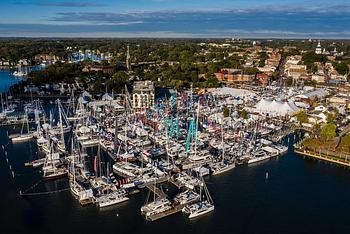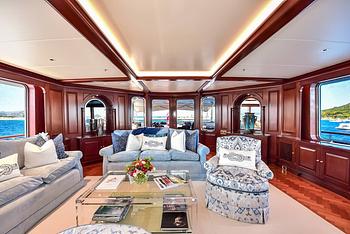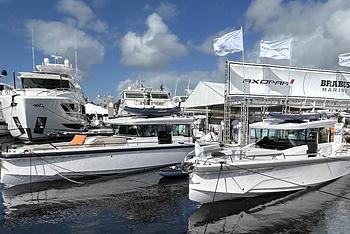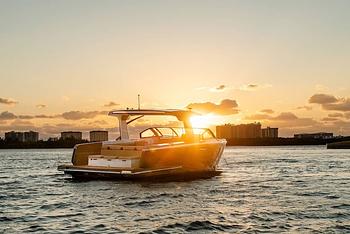New to Chartering or exploring options? Here’s everything you need to know about chartering a boat.
What does it mean to charter a boat?
Boat or Yacht chartering is the practice of renting, or chartering, a sailboat or motor yacht and travelling to various coastal or island destinations. This is usually a holiday activity, but it also can be a business event. There are two main kinds of charter: bareboat and skippered.
Types of Charter
1. Bareboat Charter
A bareboat charter is an arrangement for the chartering of a boat, whereby no crew or provisions are included as part of the agreement; instead, the people who rent the vessel from the owner are responsible for taking care of such things. Rightboat can help you add a skipper to almost any yacht and provisions can be arranged should you wish to have these on board when you arrive. If you prefer to peruse the local markets for fresh produce this is also absolutely fine.
Helpful Info:
1. Rightboat will help you create an itinerary that suits your travel needs and wishes. We know where you can safely anchor, get supplies, find privacy or enjoy the company. If you don't like the idea of anchoring through the night, you can plan an itinerary where you will always be docked in marinas during the night. In most places where charter boats are common, marinas have dock hands who will help you dock, connect your boat to local electricity and water supplies, and advise you for activities in the area.
2. If you do decide to go Bareboat charter, the charter company which operates the boat you choose is available for you at all times via radio or cell phone to answer questions and give advice while you are on your trip. In case of any unexpected problem or situation at the sea, you can contact their service. After all, they want you to have a great time, stay safe, and operate the boat correctly while you're out at the sea. When in doubt, calling for advice or assistance is always a good idea.
2. Skippered Charter
A Skippered Charter is a yacht charter where you book both a yacht and arrange for someone to skipper the yacht for you. This kind of holiday is something that can be booked by people with no previous sailing experience, or those who may have prior experience, but may not be qualified to skipper the yacht themselves or those that simply don’t wish to take on the responsibility and prefer to relax on their trip.
Helpful Info:
Any problems with the yacht will be the responsibility of the Charter company supplying the yacht, although usually if there are any minor issues the skipper will attempt to deal with these as you go along.
3. Crewed Charter
A crewed charter is essentially an all-inclusive charter, depending upon the size, yachts are either crewed just by a captain and hostess/cook, or they are operated by a full complement of the crew - Captain, Engineer, Deck hand, Professional Chef, steward, stewardess, etc, all paid for by the owner. Mostly everything is customised. And the bigger & more expensive the charter is, the more custom stuff, & toys you get!
Helpful Info:
1. While these boats do not come cheap, again when compared to the price of a 5-star hotel for a week for 3-4 couples or a full family, you will often come out well financially and have the added benefit of the privacy and freedom that come from being on your own boat.
2. Talk to the captain, Captains are generally extremely knowledgeable and can provide excellent suggestions about the itinerary, hot spots, and undiscovered places. They take great pride in doing a good job for you and can do that better if they know what you want. If something is not right, for instance, the crew is not being attentive enough or is being too attentive, please let the captain know and they will do their best to sort the issue.
Catamarans vs Monohull
Personal preference and the make-up of your group plays a large role in your choice between a catamaran and a traditional Monohull. While some purist sailors wouldn’t dream of chartering a Catamaran, they do provide many features that make them a great and increasingly common choice for a variety of reasons. On the whole, Catamarans are easier to navigate in shallow water, provide great views from the spacious galley, have an excellent sun deck, and are generally more comfortable to stay on. You don’t have to climb stairs to go inside, and you get more privacy because the cabins are separated from each other. On the flip side, a Catamaran will never sail as well as a Monohull. You 'don't feel' the wind as much as you do when you are Monohull sailing, so if you are with a group of experienced sailors looking to spend their time healing around various coastlines the choice is easy, a less experienced mixed family group, however, might benefit from a relaxed and stable catamaran holiday. You can still push a catamaran to 12 knots as we found in the Ionian islands in 2019.
Arrival at the base, Check-in Procedure & Extras
Typically, the charter market operates charters from a Saturday for a duration of seven days. The boats are usually ready around 5 pm, while ‘early check-in’ (from 1 pm) is considered an extra and has to be pre-ordered and paid. Charter companies typically expect their clients to be back at the base on the Friday before your agreed disembarkation around 5-6 pm.
If you are you are flying to your destination, Rightboat can help to organize a transfer from the airport to the marina for you. Most marinas have parking spots for guests if required. Arriving at the charter base at the agreed time is very important as charter agencies have busy schedules on the day of arrival, cleaning all the boats that have been returned that morning and want to avoid keeping you waiting.
Sailing Extras - If not ordered in advance, it is time to check you’ve got all the extras you think you might need all the extras you might like to use during the charter period. The most common types of additional equipment and gear are additional sails, a safety net (excellent idea for those travelling with small children), one-way charter (finishing your charter in a different port to which you embarked in), snorkelling gear, extra towels, and sheets, or water toys like a stand-up paddle, kayak, etc.
Sailing extras should be pre-ordered during the process of booking a yacht to save you time and guarantee availability. These small extras can make your holiday, exploring the marine wildlife with snorkelling gear or adding an outboard to your tender so you can easily ferry guests to and from shore for lunch makes a real difference when aboard. Some extras can be requested on the spot at the marina, such as extra towels, sheets, outboard engines, etc.
Insurance
When chartering a yacht, there is a security deposit to be paid. It is a safety measure in case of damage on the yacht, and its amount is specified for each yacht individually (the larger the yacht is, the larger the deposit amount is). There are two types of deposit; a refundable deposit and a non-refundable deposit. A refundable deposit is returned upon your arrival back to a marina, once the divers (Charter operators often employ a diver to check underneath every boat upon its return) and charter staff determine there are no damages to the yacht. The refundable deposit can be paid in cash or with a credit card, meaning the amount needed for deposit will be put on hold until you return the yacht. Refundable deposits are higher in price varying from one thousand to several thousand euros, depending on the boat size. A non-refundable deposit (deposit waiver) will, in case of damage to a yacht, cover all the damages no matter how costly they are. Non-refundable deposits are usually a couple of hundred euros.
Packing list – What to take on a charter holiday
Packing for a sailing holiday can be slightly tricky, so we’ve put together a few packing tips which can help you prepare for your upcoming adventure at sea. However, what to take on holidays depends solely on you and the type of charter holiday you have in mind or have booked.
Even the grandest of sailboats have limited space for storing all your belongings, which means that you must be practical when it comes to packing. It is crucial to understand which things are necessary for your sailing trip and which are the things you can do without – be realistic and the main advice is to always pack your things in duffel (soft shell) bags. They are the best choice for boats as they’re stashed away easily in stowage points.
1. Clothes
If you’re chartering in the summer, shorts, t-shirts, shirts, and dresses are a must, however, no matter how sunny and warm your chosen sailing destination might be, it can get chilly in the evenings. Therefore, be sure to take a waterproof windbreaker and a light jacket or a pullover.
It is also vital to take sun-protective clothing – hats, caps, cover-ups, sarongs, etc will ensure you don’t get sunburnt.
2. Documents and currency
You will, of course, need your passport or ID card and their photocopies, just in case. Make sure you do not forget to bring your sailing certificates if you have booked a bareboat charter. If you intend to hire a car or motorbike, you will need your driving license. Also, take your medical card and holiday insurance documents.
When it comes to money, it is recommended that you bring a combination of cash and credit cards. It is important to remember that some smaller ports may have no banks or ATMs and that in small tavernas credit cards may not be accepted. Therefore, it is a good idea to carry some cash with you.
3. Toiletries and medication
The first thing you should think about is your skin. Since you’ll be spending a lot of time out in the sun, be sure to pack suncream. Do not forget your prescription drugs, seasickness medications if you require them and insect repellents. We also recommend taking an after-sun lotion, plasters and a lip balm with you.
4. Gadgets
Nowadays, it seems almost impossible to live without certain devices, and some of them may be very useful when on a sailing holiday.
Here’s the list:
- USB charging hub - for charging up all your devices at once
- Camera/GoPro - you want to capture all those beautiful moments in high resolution
- Book or Kindle
- Portable speaker - you want this one when partying outside on stern (most yachts now already have built-in speakers)
- Aux cable - connect your devices to the yacht radio
5. Other items that might be useful
- Sunglasses
- Reading glasses
- Sunhat
- Beach towels
- Small torch
- Snorkeling gear
- Walking gear
- Playing cards, your favourite music, books
- Dry bag
We hope that with the above information you should feel more comfortable and relaxed going into your boating holiday, if you need any more information or have any other questions please don't hesitate to contact your broker.




